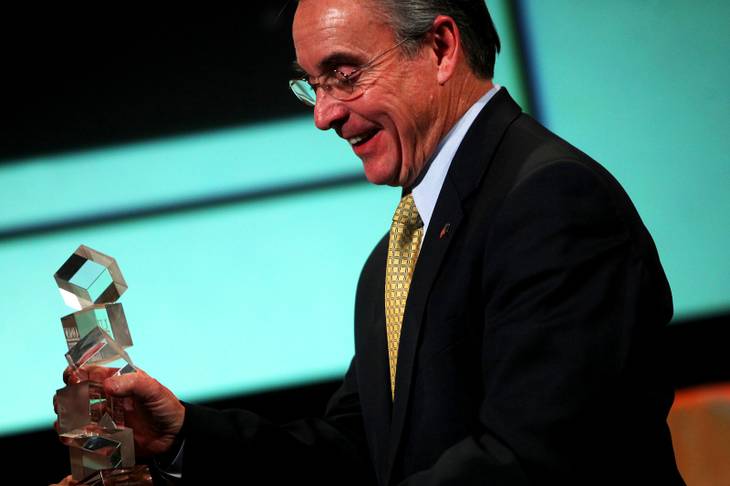Related document
Sun archives
- Higher ed system responds to lawmakers, details impact of budget cuts (4-5-2011)
- UNLV president presents cuts, says they are “a tragic loss and a giant step backward for Nevada” (3-8-2011)
- Assembly passes bill to use reserves for school construction (3-3-2011)
- Democrats say Sandoval budget has $325 million hole (2-24-2011)
- UNLV president’s somber warning on budget cuts moves faculty to tears (2-16-2011)
- Regent says it’s time that K-12 shares in budget sacrifice (2-8-2011)
- Higher education officials say Sandoval budget cuts a ‘death sentence’ (2-4-2011)
- Education in forefront of upcoming budget battle (1-30-2011)
- Chancellor: University tuition would have to go up 73 percent to cover Sandoval budget gap (1-27-2011)
- School officials warn of jobs cuts, larger classes under proposed budget (1-26-2011)
- A steep climb for Nevadans (1-26-2011)
- Soft words during State of the State hide Nevada in pain (1-25-2011)
- Teachers not pleased with most of Sandoval’s speech (1-25-2011)
- In response, Democrats say taxes might be part of budget solution (1-24-2011)
One of the nation’s top hospitality programs hopes to do better than simply survive Gov. Brian Sandoval’s steep budget cuts, while saving face with students and the community at large.
This tall order is the task of Don Snyder, the well-regarded former president of casino giant Boyd Gaming Corp. who was appointed dean of the William F. Harrah College of Hotel Administration last year.
After overseeing a plan to shave at least 10 faculty positions, eight majors and many more classes, Snyder does not sound like some of his more beleaguered colleagues at UNLV, which is facing more than $30 million in budget cuts and the loss of more than 300 professors.
According to Snyder and others inside and outside the university, the hotel college can afford to cut back after having expanded beyond its core mission of hospitality management during the go-go years in Las Vegas, when money wasn’t an issue.
About seven years ago, the college grew exponentially with the town’s gaming industry, adding multiple bachelor of science degrees, eight majors and a couple of minors.
The college expects to reverse that growth in one fell swoop, slashing its budget by 17 percent by reverting back to the single hospitality major and bachelor of science degree it offered before 2004.
“There was broad support for going back to the basics,” Snyder said. “We were not as focused as we could be.”
Hospitality employers consulted during the process said they preferred students with a broad base of knowledge over a specialized major — an important consideration for students seeking fruitful careers, he said.
Students pursuing majors on the chopping block would be allowed to either complete their degrees or opt for the hospitality major.
The proposal has already been vetted by faculty, students and some university officials but still needs several administrative approvals, which are expected to take several weeks.
Four majors expected to get the ax — professional golf management, meetings and events, gaming management, and food and beverage — will be offered instead as concentrations within the hospitality major.
The college is also proposing to eliminate its program in recreation and sport management and its entertainment minor — offerings the majority viewed as further afield from the basic hospitality curriculum, Snyder said. Six faculty members would lose their jobs as a result of the cuts.
All told, the proposed cuts would leave 42 faculty who will be asked to take on additional classes to save even more money, Snyder said.
The process wasn’t without angst.
Some professors expected to lose their jobs have spent years building up good programs, such as recreation and sport management, Snyder said.
In light of the state’s ongoing budget woes, such offshoots in the curriculum, while meaningful, aren’t sustainable long term, he said.
Faculty have emerged from a stressful process largely intact, through discussions that were healthy and respectful, Snyder said. Still, he worries that news of the cuts will fuel the perception of a once-robust program on the decline, leading to an erosion in enrollment and financial support.
The college recently received a vote of confidence in the form of a $1 million donation from the Conrad Hilton Foundation — money that will be funneled into its hotel college coursework.
“They recognize that these are tough economic times but that we’re going to use those dollars in a thoughtful, businesslike way so that others will want to invest in us, whether it’s convincing the state that their dollars are well-invested in us or working with the private sector,” said Snyder, sounding every bit like the former executive who helped raise millions for downtown’s Smith Center for the Performing Arts against daunting odds.
“We need support from the private sector, too, and I think we’ll get there with this narrowed focus,” he said.
